#Anthony Dominick Benedetto
Text

Thank you Anthony Dominick Benedetto. You’ve made our hearts sing with passion for a long, long time.
* * * *
“Life teaches you how to live it — if you live long enough.”
― Tony Bennett
42 notes
·
View notes
Text
Tony Bennett, Jazzy Crooner of the American Songbook, Is Dead at 96
From his initial success at the Paramount in Times Square through his generation-spanning duets, his career was remarkable for both its longevity and its consistency.
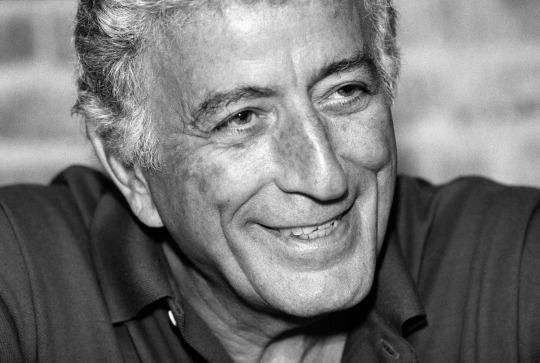
By Bruce Weber
July 21, 2023
Tony Bennett, a singer whose melodic clarity, jazz-influenced phrasing, audience-embracing persona and warm, deceptively simple interpretations of musical standards helped spread the American songbook around the world and won him generations of fans, died on Friday at his home of many decades in Manhattan. He was 96.
His publicist, Sylvia Weiner, announced his death.
Mr. Bennett learned he had Alzheimer’s disease in 2016, his wife, Susan Benedetto, told AARP The Magazine in February 2021. But he continued to perform and record despite his illness; his last public performance was in August 2021, when he appeared with Lady Gaga at Radio City Music Hall in a show titled “One Last Time.”
Mr. Bennett’s career of more than 70 years was remarkable not only for its longevity, but also for its consistency. In hundreds of concerts and club dates and more than 150 recordings, he devoted himself to preserving the classic American popular song, as written by Cole Porter, the Gershwins, Duke Ellington, Rodgers and Hammerstein and others.
From his initial success as a jazzy crooner who wowed audiences at the Paramount in Times Square in the early 1950s, through his late-in-life duets with younger singers gleaned from a range of genres and generations — most notably Lady Gaga, with whom he recorded albums in 2014 and 2021 and toured in 2015 — he was an active promoter of both songwriting and entertaining as timeless, noble pursuits.
Mr. Bennett stubbornly resisted record producers who urged gimmick songs on him, or, in the 1960s and early ’70s, who were sure that rock ’n’ roll had relegated the music he preferred to a dusty bin perused only by a dwindling population of the elderly and nostalgic.
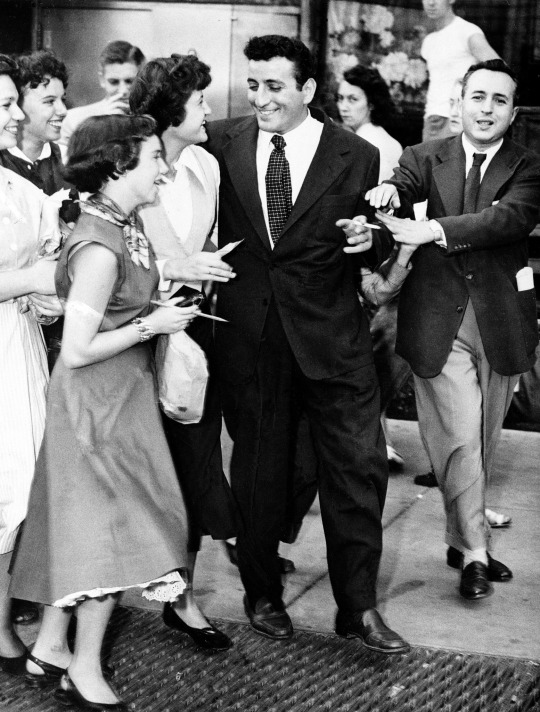
Instead, he followed in the musical path of the greatest American pop singers of the 20th century — Louis Armstrong, Bing Crosby, Judy Garland, Billie Holiday, Frank Sinatra — and carried the torch for them into the 21st. He reached the height of stardom in 1962 with a celebrated concert at Carnegie Hall and the release of his signature song, “I Left My Heart in San Francisco.” And though he saw his popularity wane with the onset of rock and his career went through a trough in the 1970s, when professional difficulties were exacerbated by a failing marriage and drug problems, he was, in the end, more than vindicated in his musical judgment.
“I wanted to sing the great songs, songs that I felt really mattered to people,” he said in “The Good Life” (1998), an autobiography written with Will Friedwald.
It’s hard to overstate Mr. Bennett’s lasting appeal. He was still singing “San Francisco” — which led many people to think he was a native of that city, though he was actually a through-and-through New Yorker — more than half a century later. He sang on Ed Sullivan’s show and David Letterman’s. He sang with Rosemary Clooney when she was in her 20s, and Celine Dion when she was in her 20s.
He made his film debut in 1966, in a critically reviled Hollywood story, “The Oscar,” playing a man betrayed by an old friend. And though he did not pursue an acting career, decades later he was playing himself in movies like the Robert De Niro-Billy Crystal gangster comedy “Analyze This” and the Jim Carrey vehicle “Bruce Almighty.” He was 64 when he appeared as a cartoon version of himself on “The Simpsons.” He was 82 when he appeared on the HBO series “Entourage,” performing one of his trademark songs, “The Good Life.”
A lifelong liberal Democrat, Mr. Bennett participated in the Selma-to-Montgomery civil rights march in 1965, and, along with Harry Belafonte, Sammy Davis Jr. and others, performed at the Stars for Freedom rally on the City of St. Jude campus on the outskirts of Montgomery on March 24, the night before the Rev. Dr. Martin Luther King Jr. delivered the address that came to be known as the “How Long? Not Long” speech. At the conclusion of the march, Viola Liuzzo, a volunteer from Michigan, drove Mr. Bennett to the airport; she was murdered later that day by members of the Ku Klux Klan.
Mr. Bennett also performed for Nelson Mandela, then the president of South Africa, during his state visit to England in 1996. He sang at the White House for John F. Kennedy and Bill Clinton, and at Buckingham Palace at Queen Elizabeth II’s 50th anniversary jubilee.
An ‘Elusive’ Voice
He won his first two Grammy Awards, for “San Francisco,” in 1963, and his last, for the album “Love for Sale,” with Lady Gaga, last year. Altogether there were 20 of them, including, in 2001, a lifetime achievement award. By some estimates, he sold more than 60 million records.
The talent that spawned this success and popularity was not so easy to define. Neither a fluid singer nor an especially powerful one, he did not have the mellifluous timbre of Crosby or the rakish swing of Sinatra. If Armstrong’s tone was distinctively gravelly, Mr. Bennett’s wasn’t quite; “sandy” was more like it. Almost no one denied that his voice was appealing, but critics strove mightily to describe it, and then to justify its appeal.
“The voice that is the basic tool of Mr. Bennett’s trade is small, thin and somewhat hoarse,” John S. Wilson wrote in The New York Times in 1962. “But he uses it shrewdly and with a skillful lack of pretension.”
In a 1974 profile, Whitney Balliett, the longtime jazz critic for The New Yorker, called Mr. Bennett “an elusive singer.”
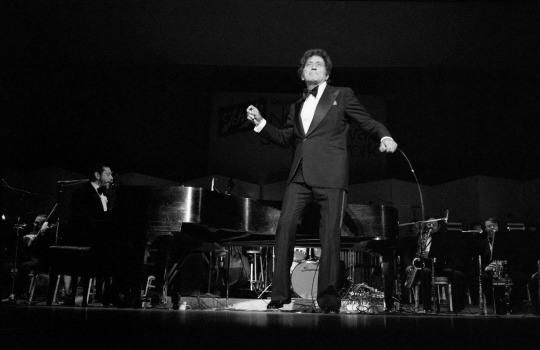
“He can be a belter who reaches rocking fortissimos,” Mr. Balliett wrote. “He drives a ballad as intensely and intimately as Sinatra. He can be a lilting, glancing jazz singer. He can be a low-key, searching supper-club performer.” But, he added, “Bennett’s voice binds all his vocal selves together.”
Most simply, perhaps, the composer and critic Alec Wilder said about Mr. Bennett’s voice, “There is a quality about it that lets you in.”
Indeed, what many listeners (including the critics) discovered about Mr. Bennett, and what they responded to, was something intangible: the care with which he treated both the song and the audience.
He had a storyteller’s grace with a lyric, a jazzman’s sureness with a melody, and in his finest performances he delivered them with a party giver’s welcome, a palpable and infectious affability. In his presentation, the songs he loved and sang — “Just in Time,” “The Best Is Yet to Come,” “Rags to Riches” and “I Wanna Be Around,” to name a handful of his emblematic hits — became engaging, life-embracing parables.
Frank Sinatra, whom Mr. Bennett counted as a mentor and friend, once put it another way.
“For my money, Tony Bennett is the best singer in the business,” he told Life magazine in 1965. “He excites me when I watch him. He moves me. He’s the singer who gets across what the composer has in mind, and probably a little more.”
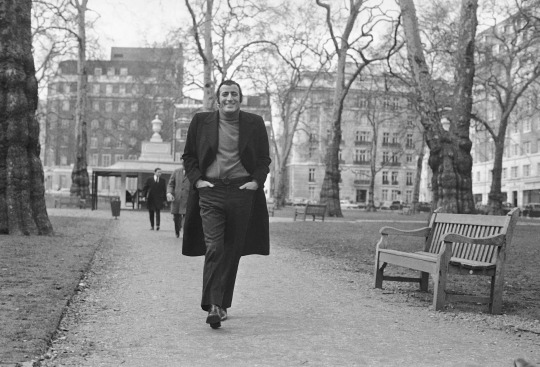
Mr. Bennett passed through life with as unscathed a public image as it is possible for a celebrity to have. Finding even mild criticism of him in reviews and interviews is no mean feat, and even his outspoken liberalism generally failed to attract vitriol from the right. (An exception was his call, after the drug-related deaths of Michael Jackson, Amy Winehouse and Whitney Houston, for the legalization of drugs, a view loudly denounced by William J. Bennett, the former drug czar, among others.)
With the possible exception of his former wives, everyone, it seemed, loved Tony Bennett. Skeptical journalists would occasionally try to pierce what they perceived as his perfect veneer, but they generally discovered that there wasn’t much to pierce.
“Bennett is outrageous,” Simon Hattenstone, a reporter for The Guardian, wrote in 2002. “He mythologizes himself, name-drops every time he opens his mouth, directs you to his altruism, is self-congratulatory to the point of indecency. He should be intolerable, but he’s one of the sweetest, most humble men I’ve ever met.”
Son of Queens
Anthony Dominick Benedetto was born on Aug. 3, 1926, in the Long Island City neighborhood of Queens, and grew up in that borough in working-class Astoria. His father, Giovanni, had emigrated from Calabria, in southern Italy, at age 11. His mother, Anna (Suraci) Benedetto, was born in New York in 1899, having made the sea journey from Italy in the womb. Their marriage was arranged. Giovanni and Anna were cousins; their mothers were sisters.
In New York, where Giovanni Benedetto became John, he was a grocer, but beleaguered by poor health and often unable to work. Anna was a factory seamstress and took in additional sewing to support the family. Anthony was their third child, their second son, and the first of any Benedetto to be born in a hospital. Giovanni, who sang Italian folk songs to his children — “My father inspired my love for music,” Mr. Bennett wrote in his autobiography — died when Anthony was 10.
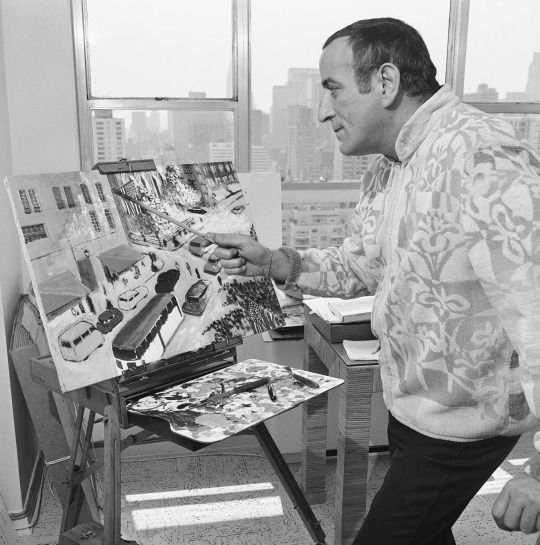
Anthony sang from an early age, and drew and painted, too. He would become a creditable painter as an adult, mostly landscapes and still lifes in watercolors and oils and portraits of musicians he admired, signing his paintings “Benedetto.” His first music teacher arranged for him to sing alongside Mayor Fiorello La Guardia at the opening of the Triborough Bridge (now the Robert F. Kennedy Bridge) in 1936.
For a time he attended the High School for Industrial Arts (now called the High School of Art and Design) in Manhattan, but he never graduated. He dropped out and found work as a copy boy for The Associated Press, in a laundry and as an elevator operator.
“I couldn’t figure out how to get the elevator to stop at the right place,” he recalled. “People ended up having to crawl out between floors.”
At night he performed at amateur shows and worked as a singing waiter. He had just begun to get paying work as a singer, using the stage name Joe Bari, when he was drafted.
He arrived in Europe toward the end of World War II, serving in Germany in the infantry. He spent time on the front lines, an experience he described as “a front-row seat in hell,” and was among the troops who arrived to liberate the prisoners at the Landsberg concentration camp, a subcamp of Dachau.
After Germany surrendered, Mr. Bennett was part of the occupying forces, assigned to special services, where he ended up as a singer with Army bands and for a time was featured in a ragtag version of the musical “On the Town” — directed by Arthur Penn, who would go on to direct “Bonnie and Clyde” and other notable movies — in the opera house in Wiesbaden.
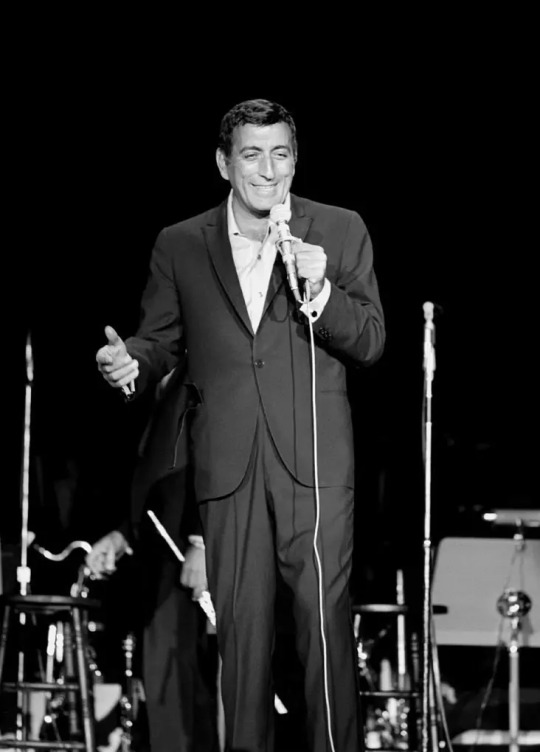
He returned to New York in August 1946 and set about beginning a career as a musician. On the G.I. Bill, he took classes at the American Theater Wing, which he later said helped teach him how to tell a story in song. He sang in nightclubs in Manhattan and Queens.
A series of breaks followed. He appeared on the radio show “Arthur Godfrey’s Talent Scouts,” the “American Idol” of its day. (The competition was won by Rosemary Clooney.) There are different versions of the biggest break in Mr. Bennett’s early career, but as he told it in “The Good Life,” he had been singing occasionally at a club in Greenwich Village where the owner had offered Pearl Bailey a gig as the headliner; she agreed, but only on the condition that Joe Bari stayed on the bill.
When Bob Hope came down to take in Ms. Bailey’s act, he liked Joe Bari so much that he asked him to open for him at the Paramount Theater. Hope had a condition, however: He didn’t like the name Joe Bari, and insisted it be changed. Dismissing the name Anthony Benedetto as too long to fit on a marquee, Hope christened the young singer Tony Bennett.
The Hits Roll In
The producer Mitch Miller signed Mr. Bennett to Columbia Records in 1950; “Boulevard of Broken Dreams” was his first single. Miller was known for his hit-making prowess, a gift that often involved matching talented singers with novelty songs or having them cover hits by others, for which he was criticized by more serious music fans and sometimes by the singers themselves.
He and Mr. Bennett had a contentious relationship. Mr. Bennett resisted his attempts at gimmickry; Miller, who believed that the producer and not the singer was in charge of a recording, applied his authority. Still, together they achieved grand success.
By mid-1951, Mr. Bennett had his first No. 1 hit, “Because of You.” That same year, his version of the Hank Williams ballad “Cold, Cold Heart” also hit No. 1; three years after Williams died in 1953, Mr. Bennett performed it in his honor at the Grand Ole Opry in Nashville.
Other trademark songs followed: “Rags to Riches” in 1953; “Stranger in Paradise,” from the Broadway show “Kismet,” also in 1953; Jule Styne, Betty Comden and Adolph Green’s “Just in Time,” from the show “Bells Are Ringing,” in 1956. That same year, Mr. Bennett was host of his own television variety show, a summer replacement for a similar show that starred another popular Italian American crooner, Perry Como. In 1958, he recorded two albums with the Count Basie band, introducing him to the jazz audience.
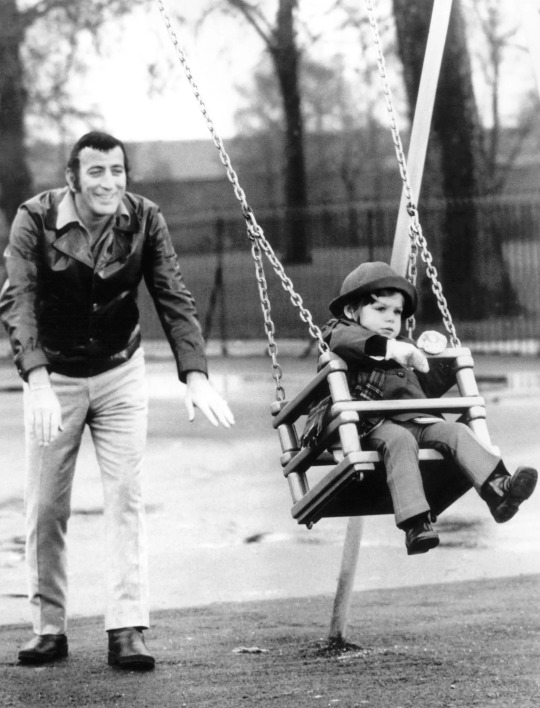
In the 1950s, Mr. Bennett toured for the first time, played Las Vegas for the first time and got married for the first time, to Patricia Beech, a fan who had seen him perform in Cleveland. The marriage would flounder in the 1960s, overwhelmed by Mr. Bennett’s perpetual touring, but their two sons would end up playing roles in Mr. Bennett’s career: the older one, D’Andrea, known as Danny, became his father’s manager, and Daegal, known as Dae, became a music producer and recording engineer.
In July 1961, Mr. Bennett was performing in Hot Springs, Ark., and about to head to the West Coast when Ralph Sharon, his longtime pianist, played him a song written by George Cory and Douglass Cross that had been moldering in a drawer for two years. Mr. Sharon and Mr. Bennett decided that it would be perfect for their next date, at the Fairmont Hotel in San Francisco, and it was.
They recorded the song — of course it was “I Left My Heart in San Francisco” — six months later, in January 1962. It won Mr. Bennett his first two Grammys, for best male solo performance and record of the year, and worldwide fame. In “The Good Life,” he wrote that he was often asked if he ever tired of singing it.
“I answer, ‘Do you ever get tired of making love?’” he wrote.
Just five months later, Mr. Bennett performed at Carnegie Hall with Mr. Sharon and a small orchestra. He got sensational reviews — though The Times’s was measured — and the recording of the concert is now considered a classic.
But as the 1960s proceeded and rock ’n’ roll became dominant, Mr. Bennett’s popularity began to slip. In 1969, he succumbed to the pressure of the new president of Columbia Records, Clive Davis, to record his versions of contemporary songs, and the result, “Tony Sings the Great Hits of Today!” — including the Beatles’ “Eleanor Rigby” and “Something” — was a musical calamity, a record that Mr. Bennett would later tell an interviewer made him vomit.
His relationship with Columbia soured further and finally ended, and by the middle of the 1970s Mr. Bennett had formed his own company, Improv Records, on which he recorded the first of two of his most critically admired albums, duets with the jazz pianist Bill Evans. (The second one was released on Evans’s label, Fantasy.) Together the two opened the Newport Jazz Festival, which had moved to New York, at Carnegie Hall in 1976.
Improv went out of business in 1977, and without a recording contract Mr. Bennett relied more and more on Las Vegas, then in decline, for regular work. His mother died that year, and the profligate life he had been living in Beverly Hills caught up with him; the Internal Revenue Service was threatening to take his house. His second marriage, a tumultuous one to the actress Sandra Grant, collapsed — she would later say that she would have been better off if she had married her previous boyfriend, Joe DiMaggio — and he had begun using marijuana and cocaine heavily.
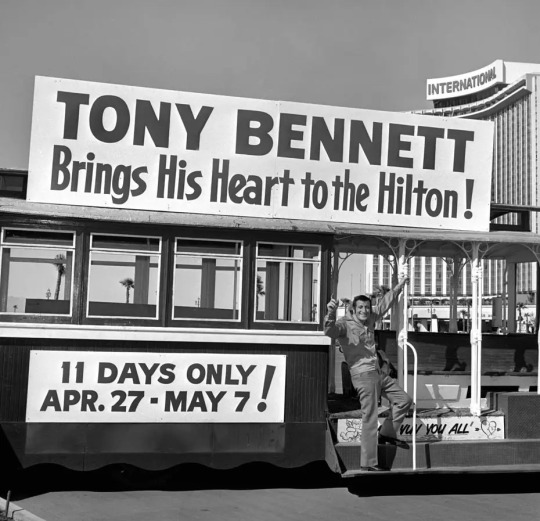
One day in 1979, high and in a panic, he took a bath to calm down and nearly died in the tub. In later years he would play down the seriousness of the event, but he wrote about it in “The Good Life,” describing what he called a near-death experience: “A golden light enveloped me in a warm glow. It was quite peaceful; in fact, I had the sense that I was about to embark on a very compelling journey. But suddenly I was jolted out of the vision. The tub was overflowing and Sandra was standing above me. She’d heard the water running for too long, and when she came in I wasn’t breathing. She pounded on my chest and literally brought me back to life.”
Mr. Bennett turned to his older son for help. Danny Bennett took over the management of his career, aiming to have the American musical standards that were his strength, and his handling of them, perceived as hip by a new generation.
Somewhat surprisingly, the strategy took hold. An article in Spin magazine, which was founded in 1985, declared Mr. Bennett and James Brown as the two foremost influences on rock ’n’ roll, and the magazine followed up with a long, admiring profile.
A Career Revival
Encouraged by executive changes at Columbia Records, Mr. Bennett returned to the Columbia fold in 1985. The next year he released the album “The Art of Excellence.” WBCN in Boston became the first rock station to give it regular airplay. Released in the emerging CD format, it spurred the sales of Mr. Bennett’s back catalog as music fans began replacing their vinyl records with CDs.
In 1993, Mr. Bennett was a presenter, along with two members of the Red Hot Chili Peppers, at MTV’s Video Music Awards. The next year he gave an hourlong performance for MTV’s “Unplugged” series, which included duets with K.D. Lang (with whom he would later tour) and Elvis Costello. The recording of the show won the Grammy for album of the year.
The revival of Mr. Bennett’s career was complete. Not only had he returned to the kind of popularity he had enjoyed 40 years earlier, but he had also been accepted by an entirely new audience.
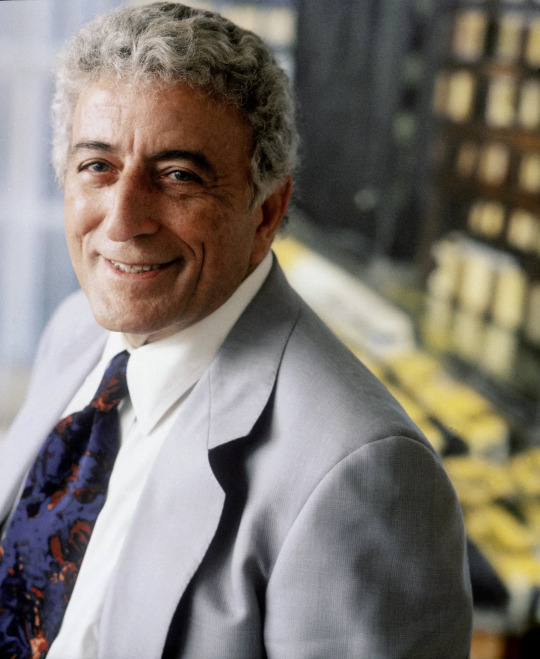
He recorded albums that honored musicians he admired — Duke Ellington, Louis Armstrong, Frank Sinatra and Billie Holiday — and he collaborated on standards with singers half, or less than half, his age. On the 2006 album “Duets: An American Classic,” he sang “If I Ruled the World” with Ms. Dion, “Smile” with Barbra Streisand and “For Once in My Life” with Stevie Wonder, and revisited his first Columbia single, “Boulevard of Broken Dreams,” with Sting. Five years later, on “Duets II,” his collaborators included Aretha Franklin, Queen Latifah, Willie Nelson and Ms. Winehouse.
As the century changed, he was once again touring, giving up to 200 performances a year, and recording prolifically.
In 2007 Mr. Bennett married a third time, to his longtime companion, Susan Crow, a teacher four decades his junior whom he had met in the late 1980s. Together they started a foundation, Exploring the Arts, that supports arts education in schools, and financed the Frank Sinatra School of the Arts, a public high school in Queens.
Mr. Bennett had lived in the same Manhattan apartment, where he died, for most of his adult life, except for a few years in Los Angeles and London, Ms. Weiner, his publicist, said. He is survived by his wife; his sons, Danny and Dae; his daughters, Johanna and Antonia Bennett; and 9 grandchildren.
If there was a magical quality to Mr. Bennett’s life, as suggested by David Evanier in a glowing 2011 biography, “All the Things You Are: The Life of Tony Bennett,” it is encapsulated by a story Mr. Bennett told to Whitney Balliett in 1974.
“I like the funny things in life that could only happen to me now,” he said. “Once, when I was singing Kurt Weill’s ‘Lost in the Stars’ in the Hollywood Bowl with Basie’s band and Buddy Rich on drums, a shooting star went falling through the sky right over my head and everyone was talking about it, and the next morning the phone rang and it was Ray Charles, who I’d never met, calling from New York. He said, ‘Hey, Tony, how’d you do that, man?’ and hung up.”
7 notes
·
View notes
Text

TONY BENNETT
Anthony Dominick Benedetto (August 3, 1926 – July 21, 2023), known professionally as Tony Bennett, was an American jazz and traditional pop singer. He received many accolades, including 20 Grammy Awards, a Lifetime Achievement Award, and two Primetime Emmy Awards. Bennett was named an NEA Jazz Master and a Kennedy Center Honoree and founded the Frank Sinatra School of the Arts in Astoria, Queens, New York. He sold more than 50 million records worldwide and earned a star on the Hollywood Walk of Fame.
0 notes
Text

Rest in Peace Anthony Dominick Benedetto, aka Tony Bennett (August 3, 1926 – July 21, 2023)
"For my money, Tony Bennett is the best singer in the business,"
---- Frank Sinatra
Edit: Deana Martin tweeted this same photo in her message of condolence. I promise I did not rip this off from her. I prefer to believe great minds think alike.
168 notes
·
View notes
Text

Tony Bennett may have been famous for singing about San Francisco, but he was a New Yorker born and bred. Born, to be specific, in Astoria, Queens, which he later said he loved more “than any place I’ve ever lived.”
When he was nine and still called Anthony Dominick Benedetto, he sang at the dedication of the Triborough (now Robert F. Kennedy) Bridge, which earned him a pat on the head from Mayor LaGuardia.
After he made it big, he and his wife established a public high school dedicated to the arts—in Astoria, of course. He named it, not after himself, but after Frank Sinatra, who had given him his first big break. Over the years he visited it frequently, often bringing surprise guests (Paul McCartney, Billy Joel, Harry Belafonte, Lady Gaga).

The Frank Sinatra School of the Arts, Astoria, Queens
For the last 25 years of his life, Tony lived in a penthouse on Central Park South and was often seen in the park with his canvas and paints.
Top photo: Tony Bennett, Twitter
Bottom photo: ennead architects
110 notes
·
View notes
Text
youtube
Tony Bennett "Because Of You" on The Ed Sullivan Show, September 23, 1951
RIP Anthony Dominick Benedetto "Tony Bennett" August 3, 1926 – July 21, 2023
65 notes
·
View notes
Text
He left his heart in San Francisco
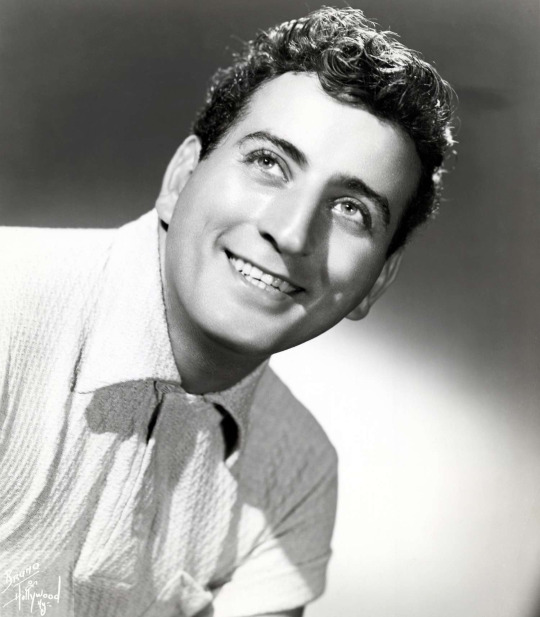
In Loving Memory of Tony Bennett
(1926 - 2023)
With heavy hearts and profound sadness, we announce the passing of a legendary icon in the world of music, Anthony Dominick Benedetto, famously known as Tony Bennett. On July 21, 2023, surrounded by loved ones, he peacefully departed from this world, leaving behind an indelible mark on the hearts of millions.
Born on August 3, 1926, in Astoria, Queens, New York, Tony's journey began in a modest Italian-American family. From a young age, his passion for music blossomed, and his extraordinary talent soon became evident. In 1949, he caught the attention of Pearl Bailey, leading to his first big break and the start of an illustrious career that spanned over seven decades.
Tony Bennett's velvety voice, timeless charm, and extraordinary range captured the imaginations of generations. With hit songs like "I Left My Heart in San Francisco," "The Way You Look Tonight," and "Fly Me to the Moon," he cemented his status as a true music legend and a leading interpreter of the Great American Songbook.
Throughout his career, Tony's talent garnered numerous accolades, including multiple Grammy Awards, honorary doctorates, and induction into the Grammy Hall of Fame. He remained active well into his later years, demonstrating his enduring dedication to his craft and inspiring countless musicians worldwide.
Beyond the stage, Tony was admired for his philanthropic endeavors and unwavering commitment to various charitable causes. He used his fame and influence to advocate for arts education, supporting countless aspiring artists to pursue their dreams.
Tony Bennett's legacy extends far beyond his music. His genuine warmth, kindness, and gentle spirit touched the lives of everyone he encountered. He was a devoted husband, father, and friend, cherishing moments spent with his loved ones.
As we bid farewell to this musical genius, we celebrate a life lived to the fullest, a life that resonated with melody, harmony, and love. Tony Bennett's spirit will forever reverberate through the melodies he gifted the world, reminding us that music transcends time and continues to unite us all.
In the hearts of his family, friends, and adoring fans, Tony will forever hold a special place, a beacon of inspiration and joy. Though he may have departed from this earthly stage, his timeless legacy will remain, an eternal symphony of love and artistry.
In lieu of flowers, the family kindly requests donations to be made to the Tony Bennett Foundation, continuing his commitment to empowering young artists.
Rest in peace, dear Tony Bennett. Your voice will continue to echo through the halls of history, and your memory will forever serenade our souls. Thank you for sharing your extraordinary gift with the world.
"Life teaches you how to live it if you live long enough." - Tony Bennett
70 notes
·
View notes
Text
Tony Bennett, the American pop and jazz singer who became the torchbearer for the Great American Songbook during a seven decade career, has died aged 96, his publicist said on Friday.
Bennett was perhaps best known for his 1962 signature song I Left My Heart in San Francisco as well as for staging an astonishing career comeback during the 80s and 90s that delivered him sustained popularity into old age. He won 18 Grammy awards, including a lifetime achievement award in 2001, and has sold more than 50m records worldwide.
In 2020, it was announced that he had been diagnosed with Alzheimer’s in 2016. He wrote on Twitter: “Life is a gift – even with Alzheimer’s.” It was revealed that while his cognitive function was impaired, he was still able to sing a whole range of his repertoire.
Bennett’s ability to perform across the genres of pop, big band and jazz won him plaudits and a conveyor belt of willing collaborators. He proved his relevance in 2014 by collaborating with Lady Gaga on the album Cheek to Cheek, which saw the pair tackle a series of jazz standards. It was a No 1 record in the US and made Bennett the oldest living act to reach the top spot, a record he already held thanks to his 2011 album Duets II.
Born Anthony Dominick Benedetto in 1926 to Italian immigrants, Bennett had an impoverished upbringing in Queens, New York. His father died when he was 10 years old, although he was already singing professionally by that point. As a teenager he became a singing waiter, earning money for the family before enrolling to study music and painting at New York’s School of Industrial Art.
Bennett was drafted into the US army in 1944 to fight in France and Germany during the final year of the second world war. It was an experience that scarred him. “It’s legalised murder,” he said during a 2013 Guardian interview.
But he continued to sing while in Germany as part of the occupying force, and in 1949, after returning home, his singing career could begin properly, first under the name Joe Bari and then as Tony Bennett.
His breakthrough came in 1951 with his first No 1, Because of You. The hits continued throughout the decade with songs such as Blue Velvet, Rags to Riches and material that looked towards the swinging sound of his childhood hero Frank Sinatra. Bennett became a teen idol, and when he married his first wife, Patricia Beech, in 1952, 2,000 female fans dressed in black to “mourn” the event outside the New York ceremony.
In 1962 he reached superstar status thanks to his version of the 1953 song I Left My Heart in San Francisco. The song won Bennett two Grammy awards and became a 20th-century pop standard.
Bennett’s style, however, was already looking outdated as the British invasion swept the US charts, and he struggled for relevance during the 1960s. The following decade saw him face a number of personal problems, including the end of his second marriage and serious drug addiction. Yet two albums recorded with pianist Bill Evans would be key to his later re-emergence as a central figure in US music.
The turning point in his life came when Bennett hired his son Danny to be his manager. Ditching the Las Vegas circuit for New York and reuniting with his early 60s pianist and musical director Ralph Sharon proved to be masterstrokes. His 1986 comeback album, The Art of Excellence, was a hit from which he never looked back. Perfectly Frank (1992) – a tribute to his idol Sinatra – topped the US Billboard’s jazz charts, while 1994’s MTV Unplugged saw Bennett win a Grammy for album of the year. Bennett became a fixture on the late-night TV circuit and collaborated with a host of artists such as kd lang, Amy Winehouse, Queen Latifah and Diana Krall, which helped maintain his relevance with younger artists. His 2006 album, Duets: An American Classic, featured appearances from Paul McCartney, Elton John and George Michael.
Bennett was drafted into the US army in 1944 to fight in France and Germany during the final year of the second world war. It was an experience that scarred him. “It’s legalised murder,” he said during a 2013 Guardian interview.
But he continued to sing while in Germany as part of the occupying force, and in 1949, after returning home, his singing career could begin properly, first under the name Joe Bari and then as Tony Bennett.
His breakthrough came in 1951 with his first No 1, Because of You. The hits continued throughout the decade with songs such as Blue Velvet, Rags to Riches and material that looked towards the swinging sound of his childhood hero Frank Sinatra. Bennett became a teen idol, and when he married his first wife, Patricia Beech, in 1952, 2,000 female fans dressed in black to “mourn” the event outside the New York ceremony.
In 1962 he reached superstar status thanks to his version of the 1953 song I Left My Heart in San Francisco. The song won Bennett two Grammy awards and became a 20th-century pop standard.
Bennett’s style, however, was already looking outdated as the British invasion swept the US charts, and he struggled for relevance during the 1960s. The following decade saw him face a number of personal problems, including the end of his second marriage and serious drug addiction. Yet two albums recorded with pianist Bill Evans would be key to his later re-emergence as a central figure in US music.
The turning point in his life came when Bennett hired his son Danny to be his manager. Ditching the Las Vegas circuit for New York and reuniting with his early 60s pianist and musical director Ralph Sharon proved to be masterstrokes. His 1986 comeback album, The Art of Excellence, was a hit from which he never looked back. Perfectly Frank (1992) – a tribute to his idol Sinatra – topped the US Billboard’s jazz charts, while 1994’s MTV Unplugged saw Bennett win a Grammy for album of the year. Bennett became a fixture on the late-night TV circuit and collaborated with a host of artists such as kd lang, Amy Winehouse, Queen Latifah and Diana Krall, which helped maintain his relevance with younger artists. His 2006 album, Duets: An American Classic, featured appearances from Paul McCartney, Elton John and George Michael.
Singing was not Bennett’s only artistic pursuit. His paintings, produced under his birth name, are on display at the Smithsonian Institution and the Butler Institute of American Art. In 2001, he founded the Frank Sinatra School of the Arts in Queens, New York which offers qualifications in fine art, dance, vocal and instrumental music, drama and film.
A lifelong Democrat, Bennett was also a supporter of the civil rights movement who participated in the 1965 Selma to Montgomery marches and refused to perform in apartheid-era South Africa.
Bennett remained determined to perform into his later life. Shortly after his 90th birthday he told the New York Times: “I could have retired 16 years ago, but I just love what I’m doing.”
41 notes
·
View notes
Text
Tony Bennett, 1926 - 2023
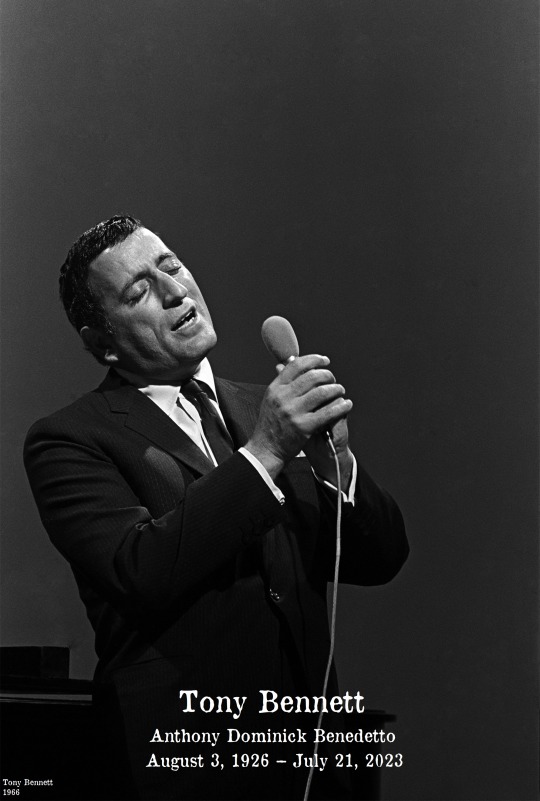
Tony Bennett
Anthony Dominick Benedetto
August 3, 1926 – July 21, 2023
Tony Bennett, Champion of the Great American Songbook, Is Dead at 96 - NYT
From his initial success as a jazzy crooner through his generation-spanning duets, his career was remarkable for both its longevity and its consistency.
Tony Bennett, Beloved Standards Crooner Who Bridged Generations, Dead at 96 - RollingStone
One of music's last standards-bearer found a new generation of fans later in his career
Tony Bennett, Master Pop Vocalist, Dies at 96 - Variety
Tony Bennett - Wikipedia
29 notes
·
View notes
Text






"Heaven Must be Jammin'"
Tony Bennett
(aka Anthony Dominick Benedetto)
1926-2023
24 notes
·
View notes
Text

Thank you Anthony Dominick Benedetto. You’ve made our hearts sing with passion for a long, long time.
* * * *
“Life teaches you how to live it — if you live long enough.”
― Tony Bennett
+
“Feeling listened to and understood changes our physiology; being able to articulate a complex feeling, and having our feelings recognized, lights up our limbic brain and creates an “aha moment”. In contrast, being met by silence and incomprehension kills the spirit. Or, as John Bowlby so memorably put it: “What can not be spoken to the [m]other cannot be told to the self.””
— Bessel Van Der Kolk, “The Body Keeps the Score: Brain, Mind and Body in the Healing of Trauma
#Tony Bennett#quotes#R.I.P.#mother#listening#being understood#physiology#John Bowlby#Bessel Van Der Kolk#The Body Keeps the Score: Brain Mind and body in the Healing of Trauma
20 notes
·
View notes
Text
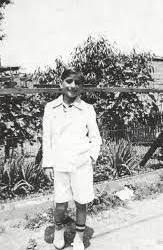
He was the proud son of Italian immigrants, and he was born on August 3, 1926 in Astoria, Queens, New York. His mother was a seamstress and his father was a grocer. His father died when he was 10.
He grew up during the Great Depression and quickly learned what life was about. With no father, the family lived in poverty, and by the age of 16, the young boy had dropped out of school to support his family.
In November 1944, during the final stages of World War II, he was drafted into the United States Army and fought in the Battle of the Bulge. After seeing the horrors of war firsthand, fighting Nazis, and liberating a concentration camp, he said, "My experience in the Army turned me into a lifelong pacifist and it’s my hope that all wars and violence will become a thing of the past."
He added, "Anybody who thinks that war is romantic obviously hasn't gone through one."
While in the army, he also saw what racism was about firsthand. He got demoted for dining with a black friend, at a time when the Army was still racially segregated.
“An Army officer blasted the two soldiers — one Black and the other White — with a hate-filled rant for being together in public,” according to The Washington Post. “In the segregated military of the day, the two men were not allowed to socialize. Back then, the punishment for Black and White soldiers associating with one another was more severe than if they fraternized with civilians in occupied Germany.”
“This officer took out a razor blade and cut my corporal stripes off my uniform right then and there,” he wrote. “He spit on them and threw them on the floor, and said, ‘Get your ass out of here!’”
~~~~~
He had been interested in singing since he was a child, and after his discharge from the Army and with the help of the GI Bill, he started studying at the American Theatre Wing. He continued performing whenever he could, even while waiting on tables.
One day, singer Pearl Bailey recognized his singing talents and asked him to open for her in Greenwich Village. There he met entertainer Bob Hope who was also impressed with him, and suggested he change his name.
He would eventually cut a demo, remembering his difficult time, growing up, singing the words, "I left my... soul behind me" in the song, "Boulevard of Broken Dreams."
By this time, he had taken Bob Hope's advice and had simplified his name, from Anthony Dominick Benedetto to . . . Tony Bennett.
“Tony Bennett, a singer whose melodic clarity, jazz-influenced phrasing, audience-embracing persona and warm, deceptively simple interpretations of musical standards helped spread the American songbook around the world and won him generations of fans, died on Friday at his home of many decades in Manhattan. He was 96,” according to the New York Times.
“Mr. Bennett learned he had Alzheimer’s disease in 2016, his wife, Susan Benedetto, told AARP The Magazine in February 2021. But he continued to perform and record despite his illness; his last public performance was in August 2021, when he appeared with Lady Gaga at Radio City Music Hall in a show titled ‘One Last Time.’
“Mr. Bennett’s career of more than 70 years was remarkable not only for its longevity, but also for its consistency. In hundreds of concerts and club dates and more than 150 recordings, he devoted himself to preserving the classic American popular song, as written by Cole Porter, the Gershwins, Duke Ellington, Rodgers and Hammerstein and others.”
The Peace Page last shared a story on Tony Bennett in 2019. This is an updated story, remembering Mr. Bennett’s life.
The Peace Page focuses on past and present stories—some seldom told, others simply forgotten, still others intentionally ignored. The stories and chapters are gathered from writers, journalists, and historians to share awareness and foster understanding—to bring people together. We thank you for taking the time to be here and helping us share awareness.
~~~~~
In July 1961, Mr. Bennett was performing in Hot Springs, Ark., and about to head to the West Coast, according to the New York Times.
Bennett's accompanist and arranger for more than 50 years, Ralph Sharon, found sheet music to a song, stashed in a drawer, along with some shirts, according to NPR. “He packed it before hitting the road.”
"I always remember," recounts Sharon. I took this out of my bag, and looked at it, and called Tony. And I said, 'You know something, we're going to San Francisco next.' And I said, 'This is a song here that might be interesting.' "
“Mr. Sharon and Mr. Bennett decided that [the song written by George Cory and Douglass Cross] would be perfect for their next date, at the Fairmont Hotel in San Francisco, and it was.”
“They recorded the song — of course it was “I Left My Heart in San Francisco” — six months later, in January 1962. It won Mr. Bennett his first two Grammys, for best male solo performance and record of the year, and worldwide fame.”
Tony Bennett would go on to become one of the most beloved singers in history, winning 20 Grammy Awards, including a Lifetime Achievement Award, and two Emmy Awards. He has sold over 50 million records worldwide.
But, he never forgot his past, and he never forgot the promise of America, saying, "we’re the greatest country," but adding the reason is "because we’re all different nationalities and all different religions."
He remembered when his good friend Harry Belafonte, who he had known since the 40s when they were both just starting out, gave him a call and "told me what was going on in the South and asked me to join Dr. King on his march to Selma.”
Bennett recalled on CNN in 2013, “I didn't want to do it, but then he told me what went down — how some Blacks were burned. Had gasoline thrown on them and they were burned. When I heard that, I said, 'I'll go with you.'"
“I knew it was important to be there and support. I remember it was decided that we wanted to set up a performance for the marchers one night, but we were in an open field. One of the organizers had a friend who owned a funeral home and they brought in 18 wooden coffins and we used that as the foundation for a stage that night."
“I kept flashing back to a time twenty years ago when my buddies and I fought our way into Germany,” he wrote in his autobiography. “It felt the same way down in Selma: the white state troopers were really hostile, and they were not shy about showing it.”
At the march, Bennett also met Detroit civil rights activist Viola Liuzzo, who had driven Bennett to the airport, according to the Detroit Free Press. The next day, Liuzzo was shot and killed by the Ku Klux Klan .
~~~~~
Bennett continued speaking out for civil rights and would also speak out against apartheid in South Africa.
He would also say his war experience gave him "a social conscience," saying he believes "every gun in the world should melt somehow and as soon as possible," and comparing America’s gun culture and the political tolerance of it to Hitler’s Germany.
He said, "I consider myself a humanist."
When he received the Jazz Foundation of America Lifetime Achievement Award, presenter Ben Stiller mentioned his admiration for the singer in taking on social justice issues long before it was fashionable, from marching in Selma to refusing to play in South Africa during Apartheid, according to Billboard.
~~~~~
“There is one other very important thing about Bennett to note and to admire,” according to the The Editorial Board of the Chicago Tribune. “He continued to perform despite the onset of dementia.
“For anyone who watched his late-in-life work with Lady Gaga, here was a remarkable example of someone who showed the world one of the oft-forgotten truths about a condition that afflicts so many Americans: People with advanced levels of dementia still can contribute a great deal, especially if it is something they have done for years.
“Bennett struggled to remember names and faces, but when he started to sing, he went on a kind of autopilot, the familiar smile returning to his face and the notes and even the lyrics flowing like good wine. This was familiar to many people who knew dementia well: a reminder that the original person always is in there, communicating and loving just as at the times when it was far more obvious to those on the outside. In his courage, Bennett offered a great deal of comfort to those who best knew what he was facing.
“Fortunately, Bennett managed to surround himself with kind family members and fellow artists who protected his reputation as they did his spirit.”
~~~~~
The Hollywood Bowl said, "Throughout his life, Tony Bennett has been a dedicated pacifist and proactive humanitarian selflessly supporting many causes whose goals benefit the lives of millions. His love for his country has earned him the distinction of national treasure and the United Nations has named him a Citizen of the World as one of their foremost ambassadors."
Bennett remembered in the army when he couldn’t dine with his Black friend.
“I couldn’t get over the fact that they condemned us for just being friends, and especially while we served our country in wartime,” Bennett wrote in his 1998 autobiography, “The Good Life.” “There we were, just two kids happy to see each other, trying to forget for the moment the horror of the war, but for the brass it just boiled down to the color of our skin.”
Bennett remembered being “terrified by the violence,” but it only confirmed his belief that no one “should suffer simply because of the color of his skin.” He continued to speak out against bigotry and hatred throughout his career, often performing with African American entertainers at a time when it wasn’t socially acceptable, according to The Washington Post.
According to an interview with Susan C. Ingram in October 2018, Bennett recalls what his former neighbor Ella Fitzgerald told him - “Tony, we are all here.” "And Ella was right, we share this planet together and we have more in common than we have differences since we are all human."
~ jsr
The Jon S. Randal Peace Page
19 notes
·
View notes
Text
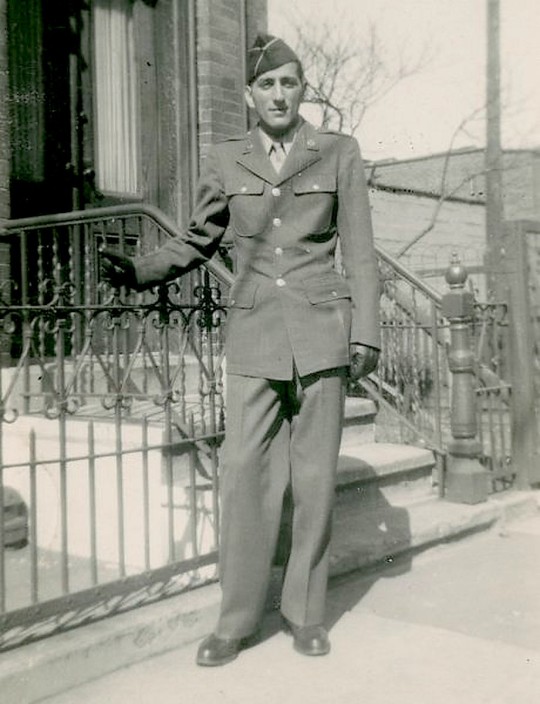
Tony Bennett
Anthony Dominick Benedetto, United States Army
63rd Infantry Division
August 3, 1926 – July 21, 2023
Tony Bennett was an American singer. Bennett amassed many accolades throughout his career, including 20 Grammy Awards, a Lifetime Achievement Award, and two Primetime Emmy Awards. He was named an NEA Jazz Master and a Kennedy Center Honoree, and was the founder of the Frank Sinatra School of the Arts in Astoria, Queens, New York. Bennett sold more than 50 million records worldwide.
Tony Bennett had come a long way since growing up poor in Queens, New York, during the Great Depression. Born Anthony Dominick Benedetto in 1926 to Italian immigrants, Bennett's father was a grocer who died when Tony was 10 years old. It wasn't long before he started helping out the family by singing while waiting tables.
Like many people and many families, the Benedettos' lives were forever changed by World War II.
Bennett turned 18 in 1944 and was drafted into the U.S. Army.
By March 1945, the young soldier was deploying to Europe with the 63rd Infantry Division, replacing casualties lost in the Battle of the Bulge. In his 1998 autobiography "The Good Life," he called the war a "front row seat in hell."
As the German Army was pushed back, Benedetto and his company saw bitter fighting in cold winter conditions, often hunkering down in foxholes as German 88 mm guns fired on them.
At the end of March, they crossed the Rhine and entered Germany, engaging in dangerous house-to-house, town-after-town fighting to clean out German soldiers; during the first week of April, they crossed the Kocher River, and by the end of the month rea ched the Danube.
During his time in combat, Benedetto narrowly escaped death several times. The experience made him a pacifist he would later write, "Anybody who thinks that war is romantic obviously hasn't gone through one,"and later say, "It was a nightmare that's permanent. I just said, 'This is not life. This is not life.'"
At the war's conclusion he was involved in the liberation of the Kaufering concentration camp, a subcamp of Dachau, near Landsberg, where some American prisoners of war from the 63rd Division had also been held. He later wrote in his autobiography that "I saw things no human being should ever have to see."
Benedetto stayed in Germany as part of the occupying force but was assigned to an informal Special Services band unit that would entertain nearby American forces. His dining with a black friend from high school—at a time when the Army was still racially segregated—led to his being demoted and reassigned to Graves Registration Service duties.
Subsequently, he sang with the 314th Army Special Services Band under the stage name Joe Bari (a name he had started using before the war, chosen after the city and province in Italy and as a partial anagram of his family origins in Calabria). He played with many musicians who would have post-war careers.
Upon his discharge from the Army and return to the States in 1946, Benedetto studied at the American Theatre Wing on the GI Bill. He was taught the bel canto singing discipline, which would keep his voice in good shape for his entire career. He continued to perform wherever he could, including while waiting tables. Based upon a suggestion from a teacher at American Theatre Wing, he developed an unusual approach that involved imitating, as he sang, the style and phrasing of other musicians—such as that of Stan Getz's saxophone and Art Tatum's piano—helping him to improvise as he interpreted a song.He made a few recordings as Bari in 1949 for small Leslie Records, but they failed to sell.
12 notes
·
View notes
Text
Charles J. Gans at AP News:
NEW YORK (AP) — Tony Bennett, the eminent and timeless stylist whose devotion to classic American songs and knack for creating new standards such as “I Left My Heart In San Francisco” graced a decadeslong career that brought him admirers from Frank Sinatra to Lady Gaga, died Friday. He was 96, just two weeks short of his birthday.
Publicist Sylvia Weiner confirmed Bennett’s death to The Associated Press, saying he died in his hometown of New York. There was no specific cause, but Bennett had been diagnosed with Alzheimer’s disease in 2016.
The last of the great saloon singers of the mid-20th century, Bennett often said his lifelong ambition was to create “a hit catalog rather than hit records.” He released more than 70 albums, bringing him 19 competitive Grammys — all but two after he reached his 60s — and enjoyed deep and lasting affection from fans and fellow artists.
[...]
He not only survived the rise of rock music but endured so long and so well that he gained new fans and collaborators, some young enough to be his grandchildren. In 2014, at age 88, Bennett broke his own record as the oldest living performer with a No. 1 album on the Billboard 200 chart for “Cheek to Cheek,” his duets project with Lady Gaga. Three years earlier, he topped the charts with “Duets II,” featuring such contemporary stars as Gaga, Carrie Underwood and Amy Winehouse, in her last studio recording. His rapport with Winehouse was captured in the Oscar-nominated documentary “Amy,” which showed Bennett patiently encouraging the insecure young singer through a performance of “Body and Soul.”
His final album, the 2021 release “Love for Sale,” featured duets with Lady Gaga on the title track, “Night and Day” and other Porter songs.
For Bennett, one of the few performers to move easily between pop and jazz, such collaborations were part of his crusade to expose new audiences to what he called the Great American Songbook.
[...]
By his early 40s, he was seemingly out of fashion. But after turning 60, an age when even the most popular artists often settle for just pleasing their older fans, Bennett and his son and manager, Danny, found creative ways to market the singer to the MTV Generation. He made guest appearances on “Late Night with David Letterman” and became a celebrity guest artist on “The Simpsons.” He wore a black T-shirt and sunglasses as a presenter with the Red Hot Chili Peppers at the 1993 MTV Music Video Awards, and his own video of “Steppin’ Out With My Baby” from his Grammy-winning Fred Astaire tribute album ended up on MTV’s hip “Buzz Bin.”
That led to an offer in 1994 to do an episode of “MTV Unplugged” with special guests Elvis Costello and k.d. lang. The evening’s performance resulted in the album, “Tony Bennett: MTV Unplugged,” which won two Grammys, including album of the year.
[...]
Long associated with San Francisco, Bennett would note that his true home was Astoria, the working-class community in the New York City borough of Queens, where he grew up during the Great Depression. The singer chose his old neighborhood as the site for the “Fame”-style public high school, the Frank Sinatra School of the Arts, that he and his third wife, Susan Crow Benedetto, a former teacher, helped found in 2001.
The school is not far from the birthplace of the man who was once Anthony Dominick Benedetto. His father was an Italian immigrant who inspired his love of singing, but he died when Anthony was 10. Bennett credited his mother, Anna, with teaching him a valuable lesson as he watched her working at home, supporting her three children as a seamstress doing piecework after his father died.
Musician Tony Bennett died at 96. Bennett collaborated with Lady Gaga very late in his career to make him relevant to younger audiences. #RIPTonyBennett
7 notes
·
View notes
Text

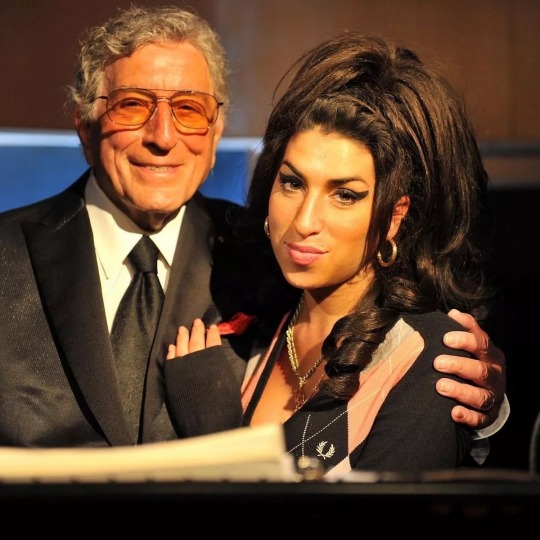
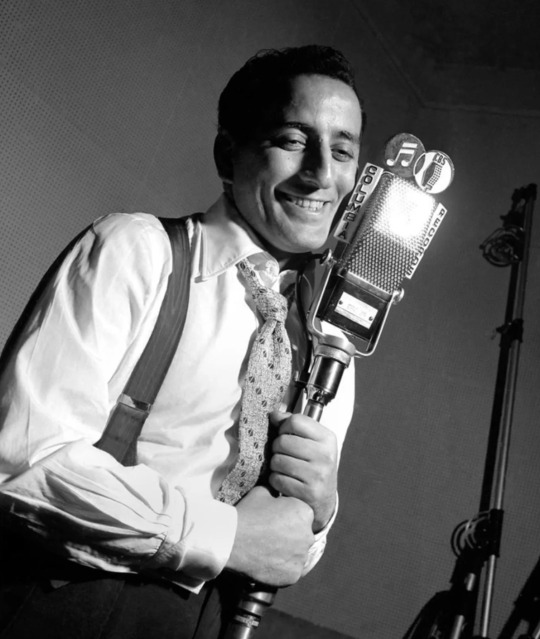


"Saloon Singer" is what Frank Sinatra called himself, meaning that lyrics were as important to him as the music. To me “Saloon singer” is an incredibly intimate thing. I feel like there’s a vulnerability of a person blessed and cursed with a gift. Creativity can be a vermin in one’s mind sometimes. Gifts or can be cumbersome and not easily balanced. All of the greats have struggled with addiction and vices, had to reinvent themselves with the changing landscape. That’s what creates the intimacy I spoke of. You may get a man on top of his world at one show, and at the next see the same man numbing his wounds with cocaine and whiskey two years later. It’s performing with your heart on your sleeve for all to see. Mr Tony Bennet said at a young age, “I don’t care if I make it, I just want to keep singing.” Talent has a way of making one a passenger in their own body. They follow fate. Mr Bob Hope told Anthony Dominick Benedetto that that name was a tad too much, you’re Tony Bennett now. Anthony hadn’t planned for that. He woke up Anthony and went to bed that night as Tony! I’ve been feeling such a loss this weekend with Tony Bennett’s passing. I feel bad because I didn’t appreciate him as much as other performers because his music was almost too smooth and tended to be a slower pace. It almost made me stereotype him that he was safe and boring. I was very wrong. If Tony Bennet was a whiskey I’d say he’d be a Woodford Reserve Double Oak. It’s a smooth sipper. Goes down with grace and finesse it’s charismaticly dangerous if you underestimate it. Mr Tony Bennet is no different. He served in the US Army when he was drafted to world war 2. He fought hard but also referred to war as “A Front-Row Seat in Hell” During his time deployed Tony was demoted for breaking segregation rules and hanging out with a Black soldier. Tony scarred by the discrimination and horrors he endured came home a pacifist. He marched in the civil rights effort in Montgomery, Alabama. Pacifist or not, he was never afraid to do the right thing. Bob Hopes work with the USO further inspired Tony to excel in his entertainment career to the point when he was praised by Mr Frank Sinatra when he told life magazine “For my money, Tony Bennett is the best singer in the business.” He won 20 Grammy awards, performed for John F Kennedy, Queen Elizabeth and Bill Clinton. He’s had an amazing life, good and bad, struggled with drugs and alcohol but ultimately fought back and stood stronger. His son was instrumental in his father’s late career successes. Tony identified talents like K.D. Lang, Amy Winehouse and Lady Gaga and shared his stage with them promoting their talents. His love and passion for music was so strong that in his final days he was by the piano immobilized at the end of his bout with Alzheimer’s disease and he came alive to sing his last song he’d ever perform, to his dear wife Susan, the song was “Because of you.” Nothing is stronger than love and music. I respected Tony Bennet because he was the last of the saloon singers, unfortunately I not, until now have had a grasp on his depth and character. I got ready this afternoon showering and getting dressed and took my time because I was listening to his MTV unplugged album and I was savoring each song as much as my Miller High Life pony. I listened to the 22 tracks almost like it was the first time I heard them. He really is a master of his craft. He’s someone we’ve been lucky enough to have in the background of our lives and there’s no one left in the saloon. No one is big enough to fill this man’s shoes. This is last call, this is an end of a truly magic era. Thank you Mr Bennet. Bravo!
2 notes
·
View notes